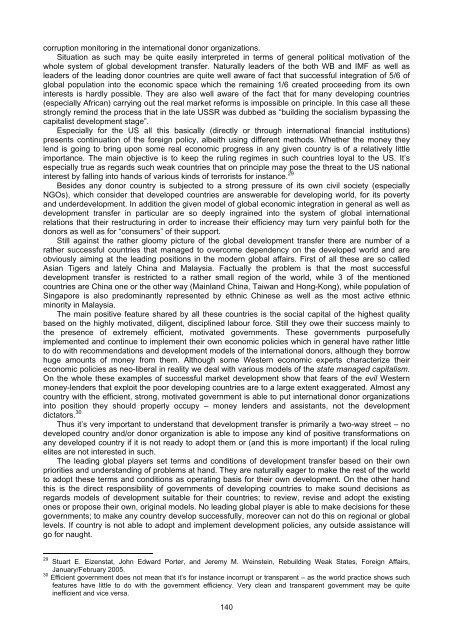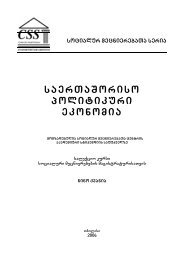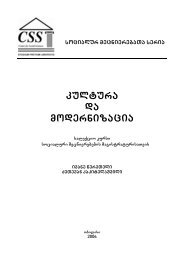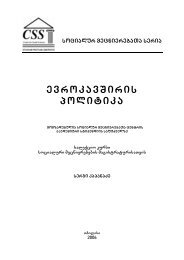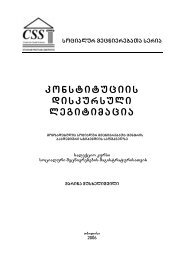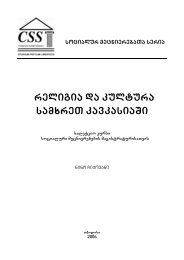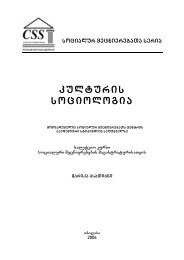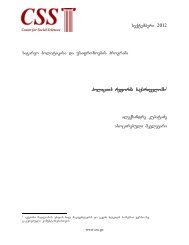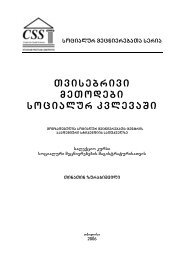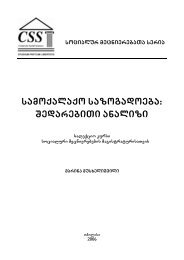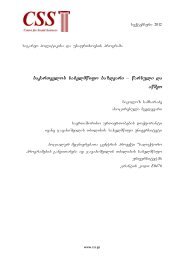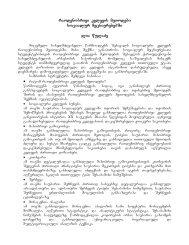corruption monitoring in the international donor organizations.Situation as such may be quite easily interpreted in terms of general political motivation of thewhole system of global development transfer. Naturally leaders of the both WB and IMF as well asleaders of the leading donor countries are quite well aware of fact that successful integration of 5/6 ofglobal population into the economic space which the remaining 1/6 created proceeding from its owninterests is hardly possible. They are also well aware of the fact that <strong>for</strong> many developing countries(especially African) carrying out the real market re<strong>for</strong>ms is impossible on principle. In this case all thesestrongly remind the process that in the late USSR was dubbed as “building the socialism bypassing thecapitalist development stage”.Especially <strong>for</strong> the US all this basically (directly or through international financial institutions)presents continuation of the <strong>for</strong>eign policy, albeith using different methods. Whether the money theylend is going to bring upon some real economic progress in any given country is of a relatively littleimportance. The main objective is to keep the ruling regimes in such countries loyal to the US. It’sespecially true as regards such weak countries that on principle may pose the threat to the US nationalinterest by falling into hands of various kinds of terrorists <strong>for</strong> instance. 29Besides any donor country is subjected to a strong pressure of its own civil society (especiallyNGOs), which consider that developed countries are answerable <strong>for</strong> developing world, <strong>for</strong> its povertyand underdevelopment. In addition the given model of global economic integration in general as well asdevelopment transfer in particular are so deeply ingrained into the system of global internationalrelations that their restructuring in order to increase their efficiency may turn very painful both <strong>for</strong> thedonors as well as <strong>for</strong> “consumers” of their support.Still against the rather gloomy picture of the global development transfer there are number of arather successful countries that managed to overcome dependency on the developed world and areobviously aiming at the leading positions in the modern global affairs. First of all these are so calledAsian Tigers and lately China and Malaysia. Factually the problem is that the most successfuldevelopment transfer is restricted to a rather small region of the world, while 3 of the mentionedcountries are China one or the other way (Mainland China, Taiwan and Hong-Kong), while population ofSingapore is also predominantly represented by ethnic Chinese as well as the most active ethnicminority in Malaysia.The main positive feature shared by all these countries is the social capital of the highest qualitybased on the highly motivated, diligent, disciplined labour <strong>for</strong>ce. Still they owe their success mainly tothe presence of extremely efficient, motivated governments. These governments purposefullyimplemented and continue to implement their own economic policies which in general have rather littleto do with recommendations and development models of the international donors, although they borrowhuge amounts of money from them. Although some Western economic experts characterize theireconomic policies as neo-liberal in reality we deal with various models of the state managed capitalism.On the whole these examples of successful market development show that fears of the evil Westernmoney-lenders that exploit the poor developing countries are to a large extent exaggerated. Almost anycountry with the efficient, strong, motivated government is able to put international donor organizationsinto position they should properly occupy – money lenders and assistants, not the developmentdictators. 30Thus it’s very important to understand that development transfer is primarily a two-way street – nodeveloped country and/or donor organization is able to impose any kind of positive trans<strong>for</strong>mations onany developed country if it is not ready to adopt them or (and this is more important) if the local rulingelites are not interested in such.The leading global players set terms and conditions of development transfer based on their ownpriorities and understanding of problems at hand. They are naturally eager to make the rest of the worldto adopt these terms and conditions as operating basis <strong>for</strong> their own development. On the other handthis is the direct responsibility of governments of developing countries to make sound decisions asregards models of development suitable <strong>for</strong> their countries; to review, revise and adopt the existingones or propose their own, original models. No leading global player is able to make decisions <strong>for</strong> thesegovernments; to make any country develop successfully, moreover can not do this on regional or globallevels. If country is not able to adopt and implement development policies, any outside assistance willgo <strong>for</strong> naught.29 Stuart E. Eizenstat, John Edward Porter, and Jeremy M. Weinstein, Rebuilding Weak States, Foreign Affairs,January/February 2005.30 Efficient government does not mean that it’s <strong>for</strong> instance incorrupt or transparent – as the world practice shows suchfeatures have little to do with the government efficiency. Very clean and transparent government may be quiteinefficient and vice versa.140
Of course if the developed world may be in dire need of successful economic trans<strong>for</strong>mation ofsome developed country as an isolated case, it may on principle do this, but on practice that meansimposing the direct colonial management model with all the pending consequences.Chapter 4. Consequences of Globalization. Population and Environment.4.1. Global Population Problem. This is one of the few exceptions when causative relationshipbetween globalization and its emergence is direct and obvious. The most plainly visible effect of thisproblem manifested itself in unprecedented growth of the world population in the post WW II period,known as “population explosion”. If in the period between 1900 to 1950 world population grew by about17 million people per year, this number almost tripled to 50 million during years 1950-1960. As a resultthe total world population reached 6 billion in 2000, or 2.4 times more than in 1950. Although populationgrowth rate is stearily declining since 1970, its amount is still expected to reach almost 9 billion by 2050and may stabilize afterwards.The lion’s share of population growth fell on developing countries. Today about 4/5 of the worldpopulation lives in these countries, while about 2/5 lives in the two largest – China and India. By itselfsuch population growth is nothing unprecedented. The most developed countries in the world hadpassed through the same stage of population development after beginning of industrial revolution. Stillthat time this process was caused by objective development factors, affected relatively small part of theglobal population (so called “golden billion”) and as a whole played positive role in global development.Here population explosion was caused by a sharp drop in population mortality rates against thetraditionally high birth rates. It was caused by gradual improvement of quality of life and general growthof population well-being. The same processes affected birth-rate as well but with the lag of decades atleast.In developing countries (majority of which at the beginning of explosive population growth were stillcolonies) mortality rates dropped virtually overnight – in a course of few years. It was caused byintroduction (sometimes purposeful, sometimes accidental) of the minimal innovations from thedeveloped countries – new medicaments (aspirin, penicillin), insecticides (DDT and like), elementaryunderstanding about personal hygiene. Anti-epidemic measures and vaccination was introduced tosome extent, population nutrition improved in some places too. All this was possible since all affectedcountries and territories had already been included into the system of global relations that makepossible relatively smooth and unimpeded transition of innovations. Factually they received the firstdevelopment package from the more developed world, which required the absolute minimum of ef<strong>for</strong>tsfrom the both sides involved in the process. On the other hand the next package involvingmodernization, structural trans<strong>for</strong>mation, etc., leading in the end to economic development withassociated growth of level and quality of live as well as changing population reproduction patterns(reducing fertility) was delivered much later and with various success.Population explosion affected countries which had just started their independent life, laggedcenturies behind their <strong>for</strong>mer parent states by levels of development. Actually one may dub this processpopulation shock instead of explosion. Population growth did not result from their socio-economicdevelopment,as it happened in the more developed world, they did not need, did not plan and could notcontrol it. Since at least at the initial stage this process was factually mechanical its dependence on thetype of civilization of any given country, culture of population, religion, etc. was minimal. 31 Evenefficiency and type of governance played very little role in this case – relatively well and poorlymanaged countries had found themselves in the same boat.Demographic pressure did not allow the majority of affected countries to stand on their own feet,contributed significantly to drop in the population level of life as compared with the colonial period (suchdrop often up to 20% was registered in 100 countries), pushed billions into poverty and starvation.Today population growth process in developing countries has been reversed and is generallyfollowing trends of the more developed world – i.e. people are marrying later and have fewer children.Average fertility rate here is about 2.8 (versus 6.2 in 1960-s), while in 20 countries births do not exceedmortality. UN claim that this reversal resulted from decades’ long family planning policies it pursued in31 This process was dubbed minimal because it happened primarily at the expense of a sharp drop of mortality rates,which did not depent upon a social behaviour of population. This may be justified <strong>for</strong> instance by the fact thatabsolutely the same “development scenario” was implemented in the isolated Soviet Central Asia as in the rest of theworld.141
- Page 1 and 2:
socialur mecnierebaTa seriamsofliop
- Page 3:
s a r C e v iSesavali .............
- Page 6 and 7:
situaciis arseboba, Tavis mxriv, am
- Page 8 and 9:
globalizacia — ori antagonisturi
- Page 10:
(informacia), vidre ramdenime aTeul
- Page 13 and 14:
TanamSromlobas. faqtiurad SesaZlebe
- Page 15 and 16:
1.3. msoflio politikis Teoriebi1.3.
- Page 17 and 18:
TanamSromlobaze uaris Tqma sul ufro
- Page 19 and 20:
danarCeni msofliosagan gansxvavebiT
- Page 21 and 22:
meqanizmebi ubralod ar arsebobs;•
- Page 23 and 24:
idga zemoT daxasiaTebul “piramidu
- Page 25 and 26:
amocanebis gadasaWrelad. 37es ar ni
- Page 27 and 28:
dacema, pirvel rigSi, materialuri d
- Page 29 and 30:
ealurad globaluri iyo. isini, isevd
- Page 31 and 32:
mSeneblobis procesSi klasobrivi brZ
- Page 33 and 34:
dolaris daxmareba miiRo.sainteresoa
- Page 35 and 36:
sistemas da gamoiwvia britaneTis im
- Page 37 and 38:
miekuTvneboda (ix. danarTi 3.1 da 3
- Page 39 and 40:
TiTqmis mTlianad ugulvebelyos is pr
- Page 41 and 42:
2.2.5. meore globalizaciis dros gag
- Page 43 and 44:
gakeTeba (iaponia). meore mxriv, er
- Page 45 and 46:
ac saboloo jamSi qmnis sistemis des
- Page 47 and 48:
laparakia imaze, rom romelime calke
- Page 49 and 50:
mmarTvelobis principebis adaptacia
- Page 51 and 52:
matareblebi arian. ukve es faqti aq
- Page 53 and 54:
warmoadgens nebismieri warmatebuli
- Page 55 and 56:
koloradosa da vaiomingis nawilebi.
- Page 57 and 58:
xSirad faqtiurad kulturuli misioner
- Page 59 and 60:
dasawyisSi oficialurad TviT aSS-ma
- Page 61 and 62:
mosaxleobis 20%, romelic yvelaze md
- Page 63 and 64:
sruli liberalizaciis Sesaxeb faqtiu
- Page 65 and 66:
gansxvavebebi, ganpirobebuli maTi e
- Page 67 and 68:
urTierTobaSi.3.4. zemoT aRwerili pr
- Page 69 and 70:
evri qveynisaTvis zemoT aRwerili ti
- Page 71 and 72:
aSS saerTaSoriso daxmarebis naxevar
- Page 73 and 74:
aSkarad sWarbobs evrogerTianebis ne
- Page 79 and 80:
meore — Tanamedrove sabrZolo saSu
- Page 81 and 82:
SeuZliaT, an ar awyobT efeqturi Ron
- Page 83 and 84:
amoiwura.cnobili ebraeli moRvawe,
- Page 85 and 86:
masze agebuli civilizaciis sistemur
- Page 87 and 88:
eJimi mravali wlis manZilze xels uw
- Page 89 and 90: mxolod SedarebiT mcire nawils Seexo
- Page 91 and 92: daavadebebiT. am konfliqtSi monawil
- Page 93 and 94: naxevar saukunes moiTvlis. principS
- Page 95 and 96: kontrols eqvemdebareba.rac Seexeba
- Page 97 and 98: • faqtiurad nebismieri gadawyveti
- Page 99 and 100: 4.2.3. globalur doneze aseTi tipis
- Page 101 and 102: krizisebisagan, rom rodesac bazari
- Page 103 and 104: sabWoTa kavSirma gamomdinare nawilo
- Page 105 and 106: usafrTxoebis erT-erTi ZiriTadi elem
- Page 107 and 108: Microsoft-is top-menejerebs). sadac
- Page 109 and 110: veb-gverdebs; xolo Google-m 2006 we
- Page 111 and 112: saxiT, amerikis moqmedeba SedarebiT
- Page 113 and 114: organizaciebis da a.S.amave dros, r
- Page 115 and 116: 2 termini globaluri mainc uamravi s
- Page 117 and 118: 61 ssrk-s SemTxvevaSi etyoba misi g
- Page 119 and 120: 30-jer naklebia, vidre saavtomobilo
- Page 121 and 122: SesaZlebelia faqtiurad nebismieri s
- Page 123 and 124: however powerful, can become transn
- Page 125 and 126: 2. Does not matter in what sphere o
- Page 127 and 128: system, which leads to restoration
- Page 129 and 130: On the other hand, in the late 19 t
- Page 131 and 132: traceable here, technological compo
- Page 133 and 134: extremist than terrorists themselve
- Page 135 and 136: human rights is routine. 24The situ
- Page 137 and 138: Transformation of Islam, as the rel
- Page 139: countries, where the government and
- Page 143 and 144: (including affiliated agencies and
- Page 145 and 146: including legal acts, represents re
- Page 147 and 148: passed by its more successful prede
- Page 149 and 150: principle should possess some cultu
- Page 151 and 152: coherent and purposeful than before


